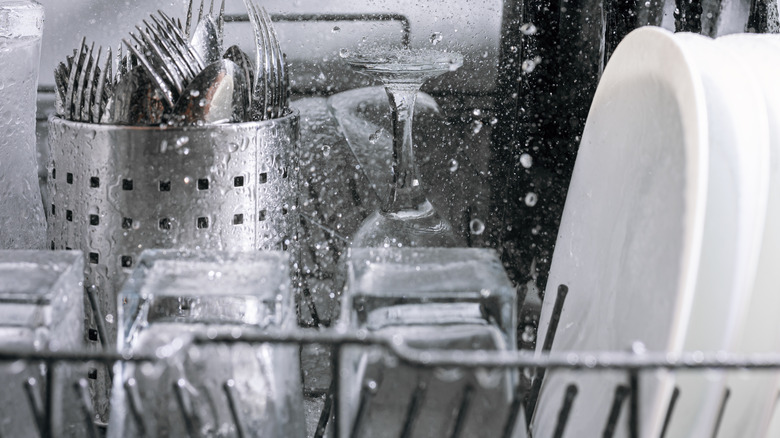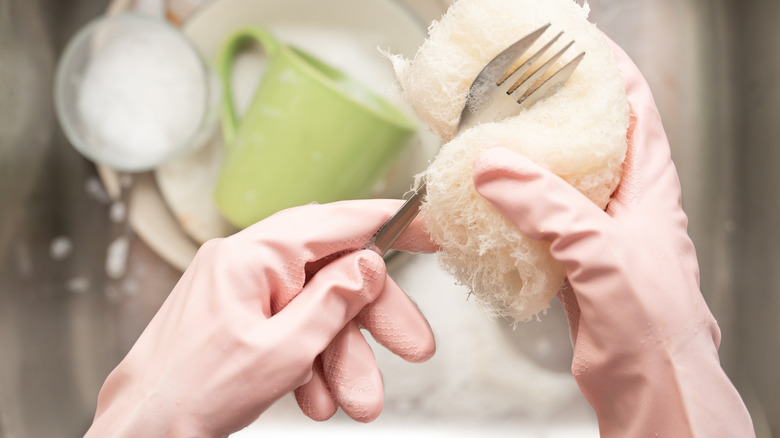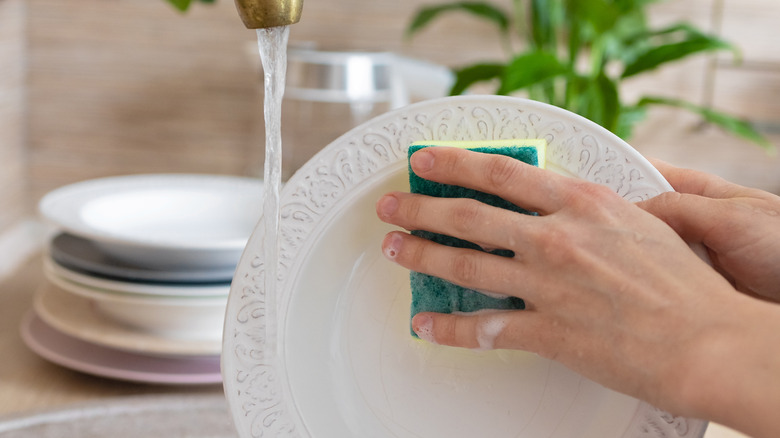The Hidden Downsides To Dishwashers
For thousands of years, humans have manually cleaned their cookware, pottery, drinking supplies, and utensils. A quick dip in hot water, some elbow grease, and a cloth or air drying was all it took. That is until the first mechanical dishwasher was patented in 1850. Though initially slow to catch on, it ultimately launched a household revolution. Today, three out of four Americans rely on one, according to Deweese.
Wealthy socialite Josephine Cochrane devised the first automated dishwasher utilizing water pressure. As IEEE Spectrum explains, she was inspired to action after too much of her fine china was damaged by cleaning the old way. Her prototype was a motorized dish cleaner. It gained favor in the hospitality industry, but it remained a luxury item, and dishwashers did not achieve widespread popularity until the 1970s.
The modern appliance has obvious advantages over manual dishwashing. It's a convenient time saver, spares physical toil, and can handle large loads. It washes, dries, and can sanitize too. The kitchen is a breeding ground for germs, and a dishwashing session will overcome E. coli and salmonella bacteria. An automated dishwasher also uses less water than washing by hand in most cases.
Unfortunately, dishwashers have hidden downsides as well. These drawbacks may not negate the positives, but are real nonetheless. In many respects, washing dishes by hand is a worthwhile alternative.
Dishwasher negatives
Cost, energy consumption, space constraints, and operating inefficiencies are some major issues. According to Forbes, the average dishwasher installation costs around $970. However, they are frequently several hundred dollars more. Adding to the expenses are detergent and electricity charges. A dishwasher may be water-efficient, but significant power is required to heat water to a sanitizing level. This undoubtedly will be reflected in your electricity bill.
The appliance is designed for large loads but is inefficient for cleaning smaller ones. It is, therefore, less practical for a single person or office space. Generally, a dishwasher cannot accommodate the largest items, which will need to be hand-washed after. Dishes, cooking equipment, and utensils that are food-stained, sticky, or oily may also require a pre-rinse by hand beforehand. A dishwasher's size can overwhelm a small kitchen or apartment. Countertop dishwashers or portable free-standing ones are available but have their own downsides, as noted by Dea Vita.
Dishwashers don't always clean efficiently — plates with spots, film, or food still on are not rare. An automated cycle is also time-consuming. If you are pressed for time and need dishes quickly, hand-washing may be preferable.
The surprising downside to dishwashers
There's another surprising reason why you may want to steer clear of dishwashers, and it has to do with your health. As reported by NPR, a Swedish study concluded that hand-washing dishes might actually be healthier than using a machine. Researchers found that immunity-related ailments in 7 to 8-year-olds, including asthma, eczema, and some allergies, were less common in households lacking dishwashers. They theorized that regular exposure to bacteria may be a factor in developing certain immunities; this has been seen in other instances and is known as the "hygiene hypothesis."
However, exposing yourself to bacteria by using dirtier dishes may not sound so appealing to everyone. If you're still sold on dishwashers and like the thought of eating off of machine-sanitized plates, there are other ways to boost your immune system and expose yourself to necessary bacteria, like eating farm-fresh or fermented foods.


